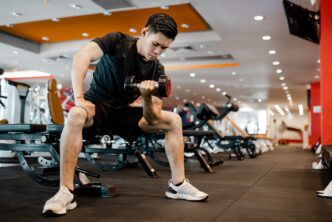As a former Olympic athlete and now a nutritionist, I’ve seen first-hand how the world of sports science is rapidly evolving. From AI-driven injury prevention to wearable devices, we’re pushing the boundaries of athletic performance. But perhaps one of the most promising frontiers is something far less visible: our mitochondria, often called the “powerhouses” of our cells, which are responsible for producing the energy we need to move, recover and thrive.
WORDS DR LAUREN BURNS
 FEATURED EXPERT FEATURED EXPERTDR LAUREN BURNS Nutritionist and Adjunct Fellow Southern Cross University |
Whether you are a professional athlete or a passionate weekend warrior, the key to reaching your performance potential doesn’t just lie in your training regime — it lies within your cells.
- The mitochondria are tiny cellular engines in our cells that produce adenosine triphosphate (ATP).
- ATP is a molecule that stores and releases energy your cells need to power everything your body does — the energy currency of our bodies.
| The singular form of “mitochondria” is mitochondrion. One mitochondrion, many mitochondria. |
Right now, cutting-edge research is showing us how optimizing mitochondria may support energy, performance and recovery.
- A recent review article highlighted how enhancing mitochondrial function improves exercise performance and reduces oxidative stress.
- The results of a systematic review and meta-analysis indicated that supporting one‘s mitochondrial health may help to reduce exercise-induced muscle damage and oxidative stress in athletes.
| Oxidative stress happens when your body produces more harmful molecules, called free radicals, than it can neutralize. This can tire out your muscles and slow recovery after exercise. |
WHY THE MITOCHONDRIA MATTER IN TRAINING
- When you push your body through intense exercise, oxidative stress can follow.
- This imbalance may lead to sluggishness, slower recovery, inflammation and even cellular damage.
That’s why supporting mitochondrial function is so important. When your mitochondria are working well, the body is better equipped to manage oxidative stress and maintain energy levels.
UBIQUINOL: A SPARK PLUG FOR YOUR MITOCHONDRIA
Ubiquinol is a natural antioxidant found in the mitochondria within all the cells in the body.
It supports the health and function of mitochondria by acting as the ‘spark plug’, helping to fire up the energy production process.
The other important role of ubiquinol is that it can help reduce the impact of oxidative stress and support the body in maintaining healthy, functioning cells.
To put it into a high-performance sports analogy:
- Ubiquinol works like a top-level support team for your body’s energy systems, keeping everything running smoothly behind the scenes.
- Just as elite athletes depend on their coaches, physiotherapists and recovery protocols to perform at their best, your body depends on key processes like those supported by ubiquinol to maintain steady, efficient energy production.
Multiple scientific studies have also documented its benefits for energy and exercise recovery, showing it may help to:
- Improve muscle performance
- Reduce muscle damage after intense exercise
- Enhance peak power output in trained athletes
- Support physical performance by increasing aerobic capacity
However, our natural levels of ubiquinol begin to decline from around the age of 20.
- Over time, this gradual drop can contribute to a noticeable dip in energy levels.
- When you layer on the demands of modern life — things like stress, poor sleep, unbalanced diets and environmental pressures — it can make it more challenging for the body to keep up with its energy needs.
EVERYDAY TIPS TO BOOST YOUR ENERGY AND OVERALL VITALITY
These strategies are not only effective, but refreshingly simple to implement:
- Prioritize sleep especially between 10 pm and 2 am. Morning sunlight exposure helps reset your circadian rhythm for better sleep quality.
- Eat the rainbow. Colourful fruits and vegetables are rich in polyphenols and antioxidants that support mitochondrial health.
- Balance meals to fuel energy. Include protein, healthy fats and complex carbs to support your mitochondria and stabilize blood sugar.
- Move often. Daily movement, even light walking or mobility work, supports mitochondrial biogenesis, which is your body’s way of making more energy-producing cells.
- Manage stress with micro-recovery. Short, phone-free walks, slow breathing, and mindfulness moments help lower inflammation and protect energy reserves.
By supporting your mitochondrial health you’re not just fueling your workouts. You are laying the foundation for long-term vitality, resilience and wellbeing. Whether you are aiming for a gold medal or simply want to feel your best day to day, looking after your energy systems from within is one of the smartest moves you can make.
| This article is part of our series on foods and how consuming these foods can affect various aspects of our health. |
References:
- Suomalainen, A., & Nunnari, J. (2024). Mitochondria at the crossroads of health and disease. Cell, 187(11), 2601–2627. https://doi.org/10.1016/j.cell.2024.04.037
- Bian, Z., & Wei, L. (2025). The role of coenzyme Q10 in exercise tolerance and muscle strength. Archives of Physiology and Biochemistry, 1–20. Advance online publication. https://doi.org/10.1080/13813455.2025.2507746
- Qu, H., & Qu, Y. (2025). Can coenzyme Q10 supplementation reduce exercise-induced muscle damage and oxidative stress in athletes? A systematic review and meta-analysis. Complementary Therapies in Clinical Practice, 60, 102001. https://doi.org/10.1016/j.ctcp.2025.102001
- San-Millán I. (2023). The Key Role of Mitochondrial Function in Health and Disease. Antioxidants (Basel, Switzerland), 12(4), 782. https://doi.org/10.3390/antiox12040782
- Wada, H., Goto, H., Hagiwara, S., & Yamamoto, Y. (2007). Redox status of coenzyme Q10 is associated with chronological age. Journal of the American Geriatrics Society, 55(7), 1141–1142. https://doi.org/10.1111/j.1532-5415.2007.01209.x
- Moreno-Fernandez, J., Puche-Juarez, M., Toledano, J. M., Chirosa, I., Chirosa, L. J., Pulido-Moran, M., Kajarabille, N., Guisado, I. M., Guisado, R., Diaz-Castro, J., & Ochoa, J. J. (2023). Ubiquinol short-term supplementation prior to strenuous exercise improves physical performance and diminishes muscle damage. Antioxidants (Basel, Switzerland), 12(6), 1193. https://doi.org/10.3390/antiox12061193
- Alf, D., Schmidt, M. E., & Siebrecht, S. C. (2013). Ubiquinol supplementation enhances peak power production in trained athletes: A double-blind, placebo controlled study. Journal of the International Society of Sports Nutrition, 10, 24. https://doi.org/10.1186/1550-2783-10-24
-
Kunching, S., Nararatwanchai, T., Chalermchai, T., Wongsupasawat, K., Sitiprapaporn, P., & Thipsiriset, A. (2022). The effects of ubiquinol supplementation on clinical parameters and physical performance of trained men. Directory of Open Access Journals. https://doi.org/10.14456/sjst-psu.2022.33














